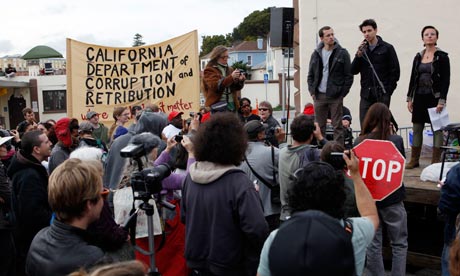Occupy demonstrators participated in a nationwide day of action to protest against the US prison system on Monday, with demonstrations carried out at over a dozen sites across the country, including prisons in California, Chicago, Denver and New York.
 |
The call to protest was issued by activists with the Occupy Oakland movement and was co-ordinated to coincide with waves of prison hunger strikes that began at California's Pelican Bay prison in July. Demonstrators denounced the use of restrictive isolation units as infringement upon fundamental human rights. The hunger strikes followed a US supreme court ruling in May which stated that overcrowding in the California prison system had led to "needless suffering and death." The court ordered the state to reduce its overall prison population from 140,000 to 110,000, which still well-exceeds the state's maximum prison capacity.
Sarah Shourd, Josh Fattal and Shane Bauer – the American hikers who were held for over a year by Iranian authorities – took part in demonstrations outside San Quentin prison in Marin County, California. Addressing the crowd, Shourd described the psychological impact of solitary confinement, saying her 14 and a half months without human contact drove her to beat the walls of her cell until her knuckles bled. Shourd noted that Nelson Mandella described the two weeks he spent in solitary confinement as the most dehumanising experience he had ever been through.
"In Iran the first thing they do is put you in solitary," Fattal added.
Bauer said "a prisoner's greatest fear is being forgotten." He described how hunger strikes became the hikers' own "greatest weapon" in pushing their captors to heed their demands. According to Bauer, however, the most influential force for changing their quality of life while being held in Iran was the result of pressure applied by those outside the prison. It was for that fact, Bauer argued, that "this movement, this Cccupy movement, needs to permeate the prisons."
Occupy supporters are calling for a fundamental change in the US prison system, which today houses one quarter of the planet's prisoners; more than 2.4 million people. As of 2005, roughly one quarter of those held in US prisons or jails had been convicted on a drug charge. Activists point out that in the past three decades the nation's prison population has increased by more than 500%, with minorities comprising 60% of those incarcerated. The number of women locked up between 1997 and 2007 increased by 832%.
Demonstrators are broadly calling for the abolition of inhumane prison conditions, and the elimination of policies such as capital punishment, life sentences without the possibility of parole and so-called "three strikes, you're out" laws.
Some demonstrators were also demanding changes in their own specific states. Activists in Columbus, Ohio, for example, highlighted the fact that their state is second only to Texas in rates of capital punishment and planned to deliver letters to several elected officials, including governor John Kasich.
Ben Turk, an activist with Red Bird Prison abolition, noted that rising prices in prison commissaries have also been an issue with many Ohio prisoners. According to Turk, prices at the commissaries where prisoners purchase food and other amenities have risen, while the amount of money prisoners are able to make have largely remained the same.
"We work with prisoners and ask them what their grievances are," Turk said. "A lot of them talk about how commissary prices have been continually rising for the last couple of decades, while state pay remains the same."
At least 20 prisoners at Ohio State Penitentiary chose to fast for the day in solidarity with Monday's action.
In Washington DC, demonstrators protested new prisoner visitation policies that will include the installation teleconference TV screens in place of glass partition.
In New York City, Mercedes Smith, a Brooklyn mother, took the streets along with roughly 250 others who marched from the Lincoln Correctional Facility through Harlem. Smith said she and her 21 year-old son had both been personally impacted by the criminal justice system. Smith said her son had been stopped and searched by the police throughout his life and is now incarcerated.
Smith carried a sign that read "End the War On Drugs". She said that people who were addicted to drugs had a "sickness" that was "not a reason to put them in prison."
"This war is costing more money. All the money that they using to keep this war going on, they could open up more centers, more programmes to help people," Smith told the Guardian.
No comments:
Post a Comment